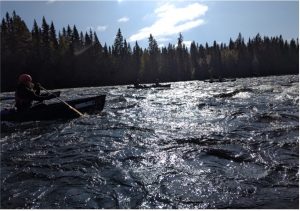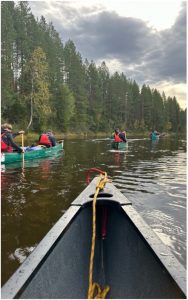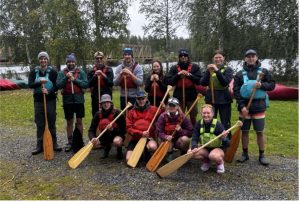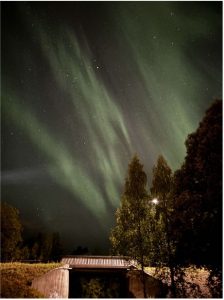Personnel from the University Air Squadrons of Birmingham (UBAS), Wales (UWAS), and Bristol (BUAS) deployed on Ex Harkan Fire to Lit, Sweden over the periods 31 Aug – 6 Sep 24, 6 – 13 Sep 24 and 13 – 20 Sep 24 respectively.
The aim was to develop UAS students through the medium of a self-sustained, multiday canoe journey. Ex HARKAN FIRE provided the opportunity for participants to develop their competencies relating to individual self-confidence, resilience, teamwork, leadership, mindfulness and military skills. It also facilitated training generic skills and knowledge that may be needed to operate with confidence in austere and isolated environments, in addition to learning and practicing canoeing and bushcraft skills.
UBAS Expedition Report
On the 30th of August, 12 University of Birmingham Air Squadron students set off for a week-long expedition of canoeing and wild camping to Sweden. It was an early start for the students, leaving their Squadron at 07:00 to make sure they made their flight from Gatwick with plenty of time before flying into Trondheim, Norway and catching a bus across the border into Sweden to their main campsite in Lit, Sweden. It was a long 3-hour bus ride, but students were already taken aback by the beautiful Scandinavian countryside and architecture and were treated with a stunning sunset. Once they arrived at camp, they all gathered around the fire, savouring their last bought meal, knowing they would have to fend for themselves for the rest of the week. That evening they got the privilege of seeing bright pink and green streaks decorating the night sky; the northern lights welcomed them on the first night in this foreign land. It was the perfect start of many more surreal experiences to come.
The next day, Saturday 31st, after being well-rested in their cabins and beds the students were given a morning brief of the basics and expectations of the expedition. This included the rules of the land in Sweden, wherever they were to go, they would have to ensure to leave it how it was, if not better. The brief also showed the group all the equipment needed for the week, including a pairs kit for each canoe and a shared kit. Food provisions were also shown; these were the basic rations for the week that the students would then bulk out with group money in a quick dash to the nearby supermarket. On their return, the packing began. To the amusement of the instructors, this was also where some of them soon realised that they would not be able to bring quite as many clothes as they anticipated. Once all kits and canoes were loaded onto trailers, the 12 students and their 2 instructors set off in minivans and were driven upstream to their starting destination. With the canoes ready to go and the students quickly taught how to tie down their equipment, they set off on the Hårkan River to their next destination. It was a rocky start, with the wind going against the students for most of the paddle that day but, thankfully, the distance was not far, and all made it to the island where they would stay safely and, most importantly, dry. On the island, the twelve were divided into groups of four. One was taught how to set up hammocks and bivies (single-man tents), the next was keen to start a fire and the other two were to cook and clean up after the meal. Some of these tasks were new skills for the students, so they had to adapt and learn quickly on the job as the light soon beginning to fade. The rest of the night was sat around the campfire drinking hot chocolate, providing a great opportunity to chat and get to know each other a little more.
In the morning, the students got to work on their morning tasks of starting a fire and taking down the camp ready to leave, with some students waking up extra early so they could go for a morning dip and brave the cold Swedish water. Once all were ready, the morning brief consisted of what was called: MY ABCDE.
• Me: where the instructor properly introduced himself.
• You: where everyone introduced themselves to the instructor.
• Area and access: assessing the route and conditions of the days travel.
• Boats and equipment: both to be checked before setting off, including making sure everyone had their helmets, paddles, and buoyancy aids.
• Communication: river signals, used by hands or the paddles
• Doctors: checking any medical issues or health worries.
• Emergency: what to do in an emergency.
The ABCDE protocol was checked every morning along with a quick warm up to get everyone stretched out for the physical canoeing to come. Then students underwent a confidence test on the water, including games about stability and what to do when the water gets rocky as well as becoming more comfortable paddling and staying in the boat. However, this also led to the first victims of the Hårkan River where one boat capsized after a student tried to climb through the legs of the other and tipped the boat, gifting them a second dip of the day. Dried off and with the kit back in the boats, the group set off on their first long paddle of the trip. Morale was kept high with many songs being sung and constant chatter between all the boats. This was important as it was the first time the group had paddled for this long. After paddling for about 2 hours, students stopped off at a small cove where they started another fire and cooked a range of foods including mini pizzas, soup, and sandwiches. Here they also were taught how to fish, which thereafter allowed them to try and catch a meal as they paddled throughout the day. Sadly, this did not materialise despite their best efforts with no fish being caught. After a few more hours of paddling the students arrived at a dam where they’d spend their next 2 nights.
The day at the dam allowed students to develop many skills. This included whittling, log chopping, fish gutting and filleting, as well as bread making. Due to the harsh white water from the dam, the students also spent time developing their canoeing skills against faster water. It was tough at first, pushing students out of their comfort zones and making them trust their partner even more in the boat. However, all students tackled the rapids and developed their teamwork and communication skills tremendously. The rest of the day was spent testing new confidence skills on the canoes in a small lagoon area, sitting on the end of them to get the front high in the air, and many people falling off and splashing about. Back at the camp, they also tried out their whittling capabilities, with one student attempting to make a recorder out of wood using just a small screw and fire embers.
The next day was the toughest, with the longest distance being covered. Upon hitting a large open water section of the river, the waves got much larger, and the wind got a lot stronger, this meant students had to really work together and use their strength, stamina, and grit to get through it. Arriving at the lunch stop, students were cold, wet, and exhausted but quickly starting a fire to warm up. As they thawed, the group were back to their normal chatty selves and ready to tackle the Hårkan River once more. With careful consideration, the pairs were swapped around to balance the boats out more, allowing everyone to stay as a group better. Consequently, ‘The Log Game’. Was created by the students, where a small log would be passed around the canoes throughout the day and the last pair to have it in their boat at the end of the day had to be dunked in the river. It kept everyone entertained, kept the group together and made the tougher parts slightly more enjoyable. That night the students got to camp and set up quickly as they were getting better and better at these new skills, meaning they had more downtime to relax. Some students once again tried to fish but to no avail, unlike the one lucky instructor who caught two that day… This seemed to be a running theme throughout the trip. After cooking up the two lonely fish in the light of another spectacular sunset, everyone relaxed. Illuminated by the glow of the fire, more camp stories and a handful of awful jokes were shared, marshmallows were toasted and burnt, and the evening ended early as everyone prepared for the final long stretch the following day.
A 05:30 wake-up on the final day allowed the warm sun to break through the trees as they packed up, a sight very warmly welcomed by all after the horrid weather the day before. The group set off with around 20km to paddle. With The Log Game in full swing, students were really getting the hang of the paddling, allowing them to take in more of the stunning scenery around them. A couple hours in, the group took a small detour down a side river to try and see if they could see some beavers as the instructors had previously seen some there on previous trips but sadly none were seen, only the remnants of chewed sticks were left to look at. As the day went on, the group reached a large rapid section of the river. Most of the students opted to lift their boats along the side of river, however, 4 students decided to brave the rapids and see how well they had developed their week-taught skills. With the instructors leading the way the boats moved down the fast river with water and themselves with it being thrown everywhere. The noise of the rushing water and the hectic shouts from the students on which way to paddle could be heard by the rest of the group who walked alongside, happy to be dry for once. One boat made it through despite the large amount of water it now held. As the two students looked back on all they had been through, they saw a singular paddle sailing down the river, but not canoe or canoers… The other boat had sunk. After emptying their boat of water and getting a spare paddle the second boat went again and this time bolted it down the rapids, clearly developing on their mistakes from earlier. Once the divided group met up again it was now just 8km before reaching the home campsite, and with spirits high and the sun shining they made light work of it making it back to camp with plenty of time to pack up their kit and have a well-deserved warm shower.
Overall, the whole expedition was a huge success and a valuable experience for all who went. The trip to the Hårkan River allowed for the opportunity to see how those involved worked under new forms of pressure by going outside their comfort zone in a plethora of ways. From the physical drive and endurance of canoeing long distances daily to working together to effectively set up every camp in their teams. Whether it was powering through a long day with aching arms or persevering when a fire wouldn’t start due to it being soaked, the students never gave up and never let their heads drop. It was a unique experience that the students felt privileged to have the opportunity to take part in and develop skills in an environment that they had never been used to.
One Officer Cadet said:
“It was great to see everyone learning from and looking out for each other. With everything we had to do each day, it was clearly not for the faint of heart. But it truly showed what we were all capable of when it came down to it. The morale was high and working as a team, we got through it together. It is definitely one to experience once in your life, if not a second time over!”
The Ulysses Trust helped massively by making this trip happen, by granting money off for the students meaning it was easier for them to attend as well as meaning they now have the opportunity to try something new in the future. The expedition to the Hårkan River has made fond memories shared by everyone who went – an experience that will indefinitely be cherished by all.
Full report – this includes details of the 3 expeditions undretaken by University Air Squadrons of Birmingham (UBAS), Wales (UWAS), and Bristol (BUAS).
“I feel stronger and more resilient after getting through river rapids and living in self-sustaining conditions this week. I have learnt how to prepare a fish caught from the river for tea, built fires and formed strong friendships with other people in my group – all with the added bonus of seeing shooting stars, an osprey nest and the northern lights!”
















